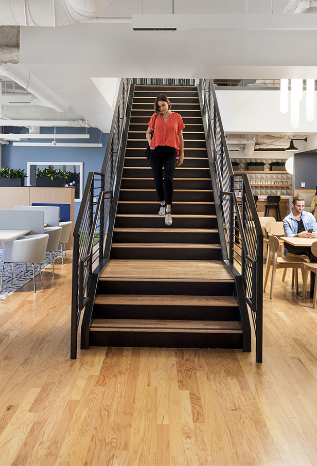From the video conferencing software that transformed the way we work when the pandemic hit in early 2020 to automation that’s making employees’ lives easier, there are endless ways that new technology in the workplace makes businesses run better.
Let’s take a look at some of the most effective and efficient technologies that could support your business in the upcoming year.
Advantages of new technology in the workplace
While some companies have long used technology in the office, the Covid-19 pandemic accelerated the use of innovative technologies, with studies showing that the pandemic accelerated the digitisation of customer interactions by several years.
The obvious example of where technology was introduced into the workplace is through the use of video conferencing like Zoom and Microsoft Teams. But it doesn’t end there. From implementing remote working measures, to systems that were better able to handle the increased demand for online purchasing, there are a huge number of technologies in use every day.
Reduced time spent on manual tasks
Automation is essential when it comes to saving time and effort. A report by Salesforce found that 73% of IT leaders credit automation for saving their employees between 10 and 50% of the time previously spent doing manual tasks.
Automation in the workplace covers a wide range of functions and can support a number of job roles, whether it’s helping your sales team input data collected from leads or automating email marketing, so your marketing teams don’t have to spend hours sending personalised emails to every customer in your database.
Reduced overheads
Thanks to improved technology like cloud-based storage and video calls, many businesses are moving towards a flexible working approach. That means you could potentially cut costs by reducing the size of your office space or even moving to a coworking space instead, to account for the fact that you’ll have fewer people in the office at any one time.
Improved customer satisfaction
Chatbots, social listening and automated emails: these all allow you to provide a more personalised customer experience. This technology can help you stand out from the crowd and ensure customers remember you over your competitors. For example, 90% of customers prefer a consistent experience across all channels, even when they hop from Facebook to live chat to your customer service hotline.
Technology like automation can help you provide a more personalised customer experience that will, in turn, lead to better retention – and with 61% of retail companies citing customer retention as their biggest challenge, any technology that helps you beat those statistics is worth looking out for.
Better collaboration
Whether your team’s in the same office space or spread out across the country, technology can bring them together, so it feels like everyone’s working in the same room. From messaging platforms like Slack, where you can ping messages to colleagues in real-time, to customer relationship management systems like HubSpot, where all information is easily accessible across sales, marketing and customer support teams, technology can, in many instances, make collaboration even smoother than ever before.
What type of technology is used in the workplace today?
We’ve given you a glimpse of some of the types of technology used in office spaces around the world. Now let’s take a closer look at some of the technology trends shaping modern workplaces.
Project management tools
Forget about paper diaries or even good old spreadsheets. There are thousands of tools available to help your team plan, assign and coordinate work across multiple teams and technologies. From Kanban-style boards like Trello to work management platforms like Asana, there are solutions to suit businesses of every shape and size, from start-ups to multinationals.
How can technology enhance teamwork and groups in the workplace?
Keep your teams connected with collaboration tools that allow them to work together as one team, whether they’re based in the same office, town, or even the same country. Today, nearly 80% of workers are using collaboration tools, up from just over half of workers since the start of the Covid-19 pandemic – and the increasing use of this technology doesn’t look like it’s stopping anytime soon.
Technology and automation in the workplace
Automation and artificial intelligence are a welcome addition to modern workplaces, helping reduce time, increase collaboration, increase efficiencies, and improve customer service. In fact, 79% of workers believe that AI and machine learning have a positive impact on the future of work worldwide.
Automation and AI can do a wide variety of things in your workplace, whether you’re scoping out new customer insights, reducing time spent on repetitive tasks, or using predictive models to make informed business decisions based on past consumer behaviour. Across the board, 61% of employees say that AI helps to make them more productive at work.
Improved security
When exchanging information over messaging platforms or using WiFi networks at home or in coffee shops, there’s an increased risk of cyber threats for businesses. However, technology also offers improved security to counter these cyber risks. Cloud-based technology is more secure than files stored on employees’ own computers, thanks to the robust cybersecurity measures on cloud-based applications.
How has technology changed training in the workplace?
In the past, if you wanted to conduct a training session for your staff, you had to find a trainer local to you – or one willing to travel at the expense of your business. Now, you have access to world-leading trainers from all corners of the globe. All you need is a good internet connection and video conferencing software, and you can offer the very best training to your teams.
From automation to collaboration, technology is working wonders for businesses all over the country. Ready to find out for yourself how technology can transform your business? Get in touch with Easy Offices today to find out how the right office space can lay the foundations for business success.

